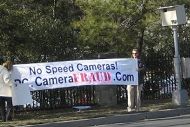2/16/2009
Mississippi House Votes to Ban Ticket Cameras; Missouri and Maryland ProtestMississippi state House votes 117-3 to ban red light and speed cameras. Public protest against photo ticketing grows in Maryland and Missouri.

A near-unanimous Mississippi state House of Representatives voted Wednesday to ban red light cameras and speed cameras while anti-camera citizen protest movements gathered steam in other parts of the country. Mississippi state Representative Edward Blackmon, Jr. (D-Canton) inadvertently kicked off the effort when he introduced a measure designed to give legislative approval to the use of photo enforcement so long as ticket records were not shared with insurance companies. Blackmon's proposal was a clever way to encourage the city councils of Columbus, Jackson, McComb, Natchez, Southaven and Tupelo, all of which have approved red light camera ordinances, in the guise of placing limitations on automated ticketing machines.
The state House Judiciary Committee would have none of it. The panel rewrote Blackmon's measure to ban not just the reporting of photo tickets to insurance companies, but also the issuance a photo ticket for any offense other than a toll violation.
"A civil or criminal traffic citation may not be issued as the result of the use of automated recording equipment on state, county or municipal highways, roads and streets, and any evidence obtained from such use shall not be reported to the Department of Public Safety for any purpose, to any person or entity for the use on any credit report or to any insurance company for insurance purposes," House Bill 1568 now states.
Blackmon was one of only three House members who voted against the revised legislation which now heads to the state Senate for its consideration.
In the state of Missouri, a group of concerned Kansas City residents gathered this weekend to protest red light cameras. The event took place at the location of the city's first red light camera which is to be activated later this week. The citizens' group Liberty Restoration Project insisted that red light cameras increase accidents (view studies) and urged passersby to support Senate Bill 211, a measure that would ban all photo ticketing (view details). The legislation will be considered in a state Senate hearing this week.
At the same time in Maryland, a group of citizens gathered on Connecticut Avenue in Chevy Chase, just over the border from Washington, DC, to protest at the site of a notorious speed camera trap. Members of the newly formed DC.CameraFraud.com pointed out that the speed cameras were located on a six-lane boulevard -- not a school zone or residential neighborhood as required by state law -- and that the cameras themselves were hidden behind trees and signs. The group hopes to raise awareness in the Washington, DC metropolitan area as Virginia municipalities begin to re-install red light cameras, the District adds new speed cameras and the Maryland legislature contemplates using photo radar on freeways for the first time.
Article Excerpt:Mississippi Legislature, Regular Session 2009
HOUSE BILL NO. 1568
Version as amended and passed by the House
AN ACT TO PROHIBIT TRAFFIC CITATIONS ISSUED AS THE RESULT OF THE USE OF ELECTRONIC SPEED SENSORS OR CAMERAS FROM BEING REPORTED TO THE DEPARTMENT OF PUBLIC SAFETY OR INSURANCE COMPANIES; AND FOR RELATED PURPOSES.
BE IT ENACTED BY THE LEGISLATURE OF THE STATE OF MISSISSIPPI:
SECTION 1.
(1) A civil or criminal traffic citation may not be issued as the result of the use of automated recording equipment on state, county or municipal highways, roads and streets, and any evidence obtained from such use shall not be reported to the Department of Public Safety for any purpose, to any person or entity for the use on any credit report or to any insurance company for insurance purposes. For the purpose of this section, the term "automated recording equipment" means a camera or optical device designed to record images that depict the vehicle, the vehicle operator, the license plate of the vehicle and/or other images to establish evidence that the vehicle or its operator is not in compliance with a law, ordinance, order or other provision imposed by the state or a political subdivision thereof, or the payment of tolls at toll facilities.
(2) Nothing in subsection (1) of this section shall be construed to prohibit the use of automated recording equipment to enforce the payment of tolls at toll facilities, as provided under Section 65-43-73.
SECTION 2. This act shall take effect and be in force from and after July 1, 2009.


